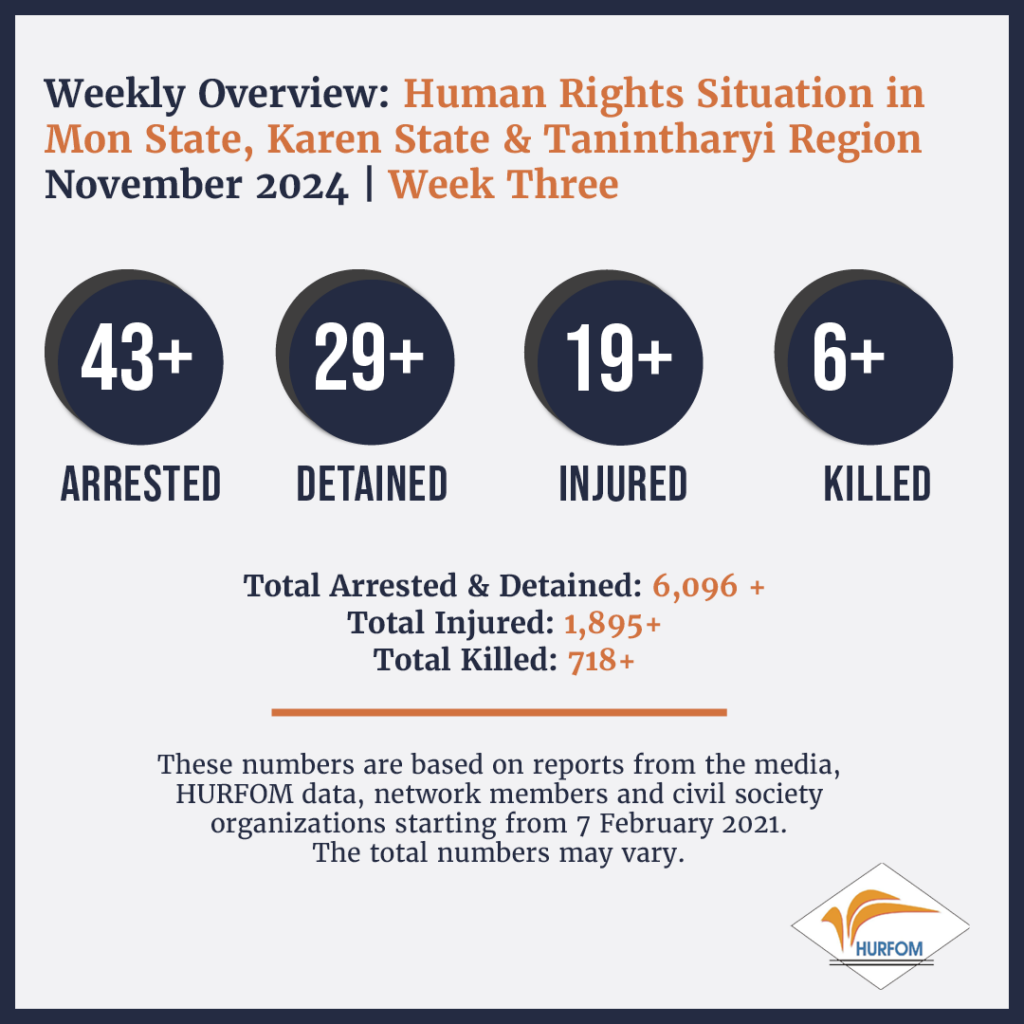Weekly Analysis: Military Junta Seeks to Illegally Advance Conscription Efforts Through Bribery and Extortion
November 25, 2024
HURFOM: The 2010 People’s Military Service Law is now being enforced for the first time since it was passed over a decade ago. In February 2024, the military junta unjustly ordered mandatory military service, requiring all men aged 18 to 35 and women aged 18 to 27 to serve in the Myanmar Armed Forces for at least two years. The announcement met with immediate backlash and fear as young people felt apprehensive and uncertain. Nearly one year has passed since its implementation, and the impacts continue to be consequential.
In targeted areas of the Human Rights Foundation of Monland (HURFOM), including Mon State, Karen State, and the Tanintharyi region, families are devastated as they have been separated from their loved ones who have been recruited to the battlefield while being forced to pay exorbitant rates of bribery and extortion to fund the conscription bid.

In coordination with the General Administration Department and other defense forces under their control, the Mon State junta is using exploitative methods to meet the required conscription quotas for the upcoming Batch No. 7 of military service training. HURFOM field reporters have revealed that the junta is issuing fake Mon State identification cards to migrant workers from other regions, falsely registering them as Mon State residents to compel their participation in military training programs.
Junta officials, including village and ward administrators, are actively involved in creating these fraudulent identification documents. Migrant workers, often working in Mon State for daily wages, are being lured or coerced into military training under the pretext of being Mon State natives. Many of these workers are targeted because they lack the resources or influence to resist the junta’s tactics, which include falsifying household registration records and educational credentials.
A local administrator in the recruitment process shared, “They collect lists village by village. The priority is registering Mon State residents, but when they cannot find enough people, they falsify household documents, IDs, and other records. They collaborate with immigration officials to make it appear legitimate. This is happening everywhere, including Mudon and Chaungzon townships.”
The military’s recruitment efforts have become increasingly aggressive as the number of willing conscripts sharply declines. The junta has resorted to offering immunity to individuals with criminal records, misleading unemployed youth with promises of financial incentives, and even targeting migrant workers with no connections to Mon State. Sources indicate that the junta has been using funds forcibly collected from the public to pay as much as 5 to 6 million Myanmar Kyat (2,300 USD – 2,800 USD) per conscript, further deepening the financial burden on civilians.
Additionally, reports suggest that migrant workers from other states and regions, many of whom are ethnic Burmese, are being issued Mon State identification cards. This has raised concerns among Mon communities about the long-term demographic impact, as there are fears of increased Burmanization and a loss of Mon cultural identity.
A local source involved in the recruitment process stated, “This conscription is being carried out with full knowledge of the junta’s military recruitment oversight committee. They have turned a blind eye to these exploitative practices. Even young men recruited on rental contracts are being paid with funds extorted from local people.”
The ongoing forced conscription practices highlight the junta’s desperation to fulfill its military needs, particularly in Mon State. Beyond the immediate human rights violations, these actions create widespread fear and distrust within local communities, further destabilizing the region. Residents of Mon State worry that these forced recruitment methods will not only continue to oppress vulnerable groups but will also significantly alter the region’s demographic balance in the long term.
Overview of Main Cases
Young Woman Killed, Five Injured in Junta Artillery Shelling, Dawei
A young woman was killed and five others injured in Shin Mokthi village, Dawei Township, following artillery shelling by junta forces stationed at the Shwe Gu Bridge on the Dawei–Myeik Highway. The attack occurred on the night of November 16 at 8 PM.
Earlier that evening, members of the Kawthoolei Armed Forces (KTLA) launched an attack on the Shwe Gu Bridge checkpoint. In response, the junta indiscriminately shelled nearby villages, including Yaung Maw and Shin Mokthi.
Two Young Men Face Charges for Evading Conscription in Mon State
Two young men from Mottama Kywe Cham village in Paung Township, Mon State, have been charged under the National Conscription Law for evading mandatory military service.
The two youths, Kyaw Chan Nyein Saw and Ko Htee Hlaing Win, both 30 years old, were accused of fleeing instead of attending mandatory military training after being selected through the conscription process.
Forced Evictions and Raids by Junta Forces in Dawei: Civilians Displaced and Stripped of Property
Junta forces in Dawei have begun conducting raids on residential areas they deem “unsafe” for their operations, according to local residents. These actions include forced entry into homes, confiscation of valuables, destruction of property, and orders for immediate eviction, leaving many civilians in distress.
Junta Seals Six Houses in Paung Township Under Accusations of Terrorism
In the first two weeks of November, six houses in Oak Ta Dar village, Paung Township, Mon State, were sealed off.



















































